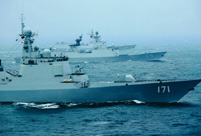

BEIJING, March 30 -- Various achievements made during the peaceful development of cross-Strait relations would suffer if the political basis of the 1992 Consensus were undermined, a mainland spokesperson said Wednesday.
"The 1992 Consensus is the political basis for the peaceful development of relations across the Taiwan Strait," said An Fengshan of the State Council's Taiwan Affairs Office at a press conference.
Only by accepting the historical fact of the 1992 Consensus and recognizing its core implication that both sides belong to one China can the peaceful and stable development of cross-Strait ties be maintained, he said.
An made the remarks when he was asked to comment on the unclear stance on the 1992 Consensus by Taiwan's incoming leader Tsai Ing-wen.
The mainland's Taiwan affairs chief Zhang Zhijun has made it clear during a recent interview with Taiwan reporters that the mainland's adherence to the 1992 Consensus is "both our principle and a gesture of goodwill," An said.
Holding what kind of stance on the 1992 consensus and how to define the nature of cross-Strait ties are the touchstones and criteria for a genuine gesture of goodwill, An added.
"Only by clarifying the nature of cross-Strait ties can one see clearly the future of cross-Strait ties," An said.
The spokesperson noted, however, no matter what a political party or group in Taiwan had advocated before, as long as it accepts the historical fact of the 1992 Consensus and recognizes its core implication, the mainland is willing to conduct exchanges with it.
Responding to a request to comment on the election of Hung Hsiu-chu as the chairperson of Kuomintang (KMT), An said he hoped the Communist Party of China (CPC) and KMT can continue to promote the peaceful development of cross-Strait relations on the basis of the 1992 Consensus.
The CPC and KMT would continue to enhance communication and boost interaction via this platform, An said.
 Train rides through blossoms
Train rides through blossoms HD pictures of battleships of PLA Navy
HD pictures of battleships of PLA Navy East Sea Fleet conducts combat drills
East Sea Fleet conducts combat drills Sophie Marceau goes square dancing in Guangzhou
Sophie Marceau goes square dancing in Guangzhou Police officers learn Wing Chun in E. China
Police officers learn Wing Chun in E. China Charming models compete in super model contest in Beijing
Charming models compete in super model contest in Beijing Thai most beautiful transgender Nong Poy release new photos
Thai most beautiful transgender Nong Poy release new photos Now and then photos of Shanghai Jiaotong University
Now and then photos of Shanghai Jiaotong University Is this what air travel will look like in 2050?
Is this what air travel will look like in 2050? Top 20 hottest women in the world in 2014
Top 20 hottest women in the world in 2014 Top 10 hardest languages to learn
Top 10 hardest languages to learn 10 Chinese female stars with most beautiful faces
10 Chinese female stars with most beautiful faces China’s Top 10 Unique Bridges, Highways and Roads
China’s Top 10 Unique Bridges, Highways and Roads How expecting moms from other countries have made Chinese childbirths their own
How expecting moms from other countries have made Chinese childbirths their own Security device maker readies for increase in demand after European terror attacks
Security device maker readies for increase in demand after European terror attacks What keeps Chinese from generosity?
What keeps Chinese from generosity? Parents turn to Hong Kong clinics as vaccine scandal fuels fear
Parents turn to Hong Kong clinics as vaccine scandal fuels fearDay|Week